If you’ve found this article by searching “my gums are bleeding”, you are in the right place. Have you noticed that you or your child have bleeding gums or gingival bleeding, perhaps while brushing your teeth? If so, it’s great that you’re reading up on how to stop bleeding gums and improve overall oral health, since this is not a problem that should be ignored. Even if you just have red gums or a gum bleeding around one tooth, it could be a sign of oral and gum health problems that need attention.
Fortunately, it’s often possible to stop bleeding gums without even visiting a dentist. In this article, you can read about some common bleeding gums causes and treatments – including mouthwashes and toothpastes for bleeding gums. We’ll also explain the symptoms of more serious conditions related to a bleeding mouth which might require medical care.
It’s common for women to experience sore, swollen and bleeding gums during pregnancy, so you can read about that here too – as well as what to do if you notice your child has bloody gums, and how to improve their gum health as well.
We hope this information helps you learn how to stop bleeding gums, and make better decisions about your oral health so you can maintain healthy gums and teeth.
Why are my gums bleeding or red?
Why do gums bleed? By far the most common reason for bleeding gums is gum disease. In its most mild form (gingivitis) it begins as slight swelling, redness and irritation around the gums, but as it becomes more advanced (periodontitis) it can lead to bloody gums, dental abscesses and tooth loss.
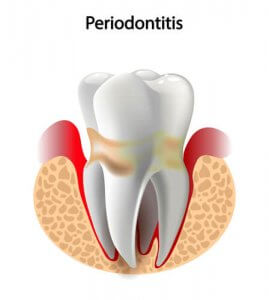

Early gum disease affects 50% of American adults, according to the CDC, and the vast majority of cases are preventable.
Gum disease is almost always the result of poor oral hygiene. When teeth aren’t cleaned properly, bacteria builds up between the tooth and gum and forms a layer of dental plaque. This plaque irritates the gum around the tooth, and gums can become swollen and puffy as your body tries to fight the bacteria. These conditions often cause the gums to bleed, too – especially when aggravated further by a toothbrush or dental floss.
Pregnant women need to take particular care with their gum health because hormone changes during pregnancy make them more susceptible to tooth decay and gum disease.
There are other conditions that might cause gums to bleed, including:
- Stress
- Bruxism (teeth grinding)
- Oral cancer
- Leukemia
However, these causes of bleeding gums are rare. It’s much more likely your gums are bleeding because of poor oral hygiene leading to gum disease. If you’re taking aspirin or other blood-thinning medication, this can make gums more likely to bleed – and bleed for longer.
Further down you can find out what to do if you’ve noticed bleeding from your mouth.
The short video below from dental hygienist Whitney also gives a really good overview of the causes and how to stop your gums from bleeding:
Do I have a bleeding tooth?
It might look like your teeth are bleeding, but if you think you see blood coming from your teeth, it’s almost certainly just the gum bleeding around your tooth.
The hard outer surface of your tooth, dental enamel, has no blood supply. It’s only the inner pulp chamber which contains blood vessels. Your gums, on the other hand, are full of blood vessels which will cause bleeding gums if they are exposed.
Note: If a tooth is broken due to injury or trauma, exposing the dental pulp, you may see the tooth bleeding from the center. If this is the case, follow this dental emergency advice and seek urgent medical care.
Sensitive, sore or red gums
Perhaps your gums aren’t actually bleeding, but instead they are noticeably irritated or red. You might be experiencing sensitive gums, or just have a sore gum around one tooth.
These are all signs of gingivitis (gum inflammation from early gum disease). Improving your gum health may be enough to reverse these symptoms before your gums start bleeding, so keep reading to find out what to do next to get healthy gums.
Bloody or swollen gums, with or without pain
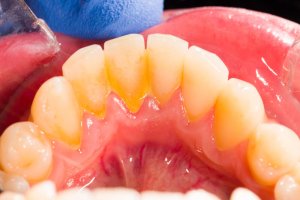

Healthy gums should be flat and smooth along the gum line, with a small point between each tooth (called a papilla). A raised line along the teeth or swollen gum between teeth is a sign that your body is fighting bacteria and trying to stop it from entering other parts of your body. In other words, swollen gums – even with no pain – are just another symptom of gum disease.
You might notice you have swollen gums behind your front teeth more often than in other places, and there’s a reason for this. Saliva tends to pool in this area of your mouth, and it contains proteins which can cause plaque to harden into tartar more quickly than it does normally. This encourages more bacteria to breed, and the problem escalates. Tartar can’t be removed by brushing; your dentist needs to use special tools to dislodge it.
If you’re concerned about your oral health because your gums are bleeding or you have another concerning symptom, you can get dental advice right now by calling 866-383-0748. You’ll be connected with a periodontist in your area to set up a consultation.
What causes bleeding gums?
We’ve established that gum disease is one of the main causes of bleeding gums, and insufficient oral care is the main reason for gum disease. Later on we’ll explain how you should be taking care of your mouth and which products are useful for treating bleeding gums and getting healthy gums. But first, there are a few specific things that might explain why your gums bleed at a particular time.
Gum bleeds when brushing teeth
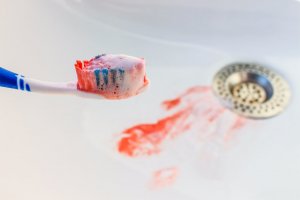

Have you noticed your gums bleeding when brushing your teeth? Healthy gums shouldn’t result in bleeding gums when brushing with the proper technique, so this is probably a sign of gum disease. But it’s not all bad news; the fact that your gums bleed when brushing your teeth at least means you’re brushing where it’s really needed – down at the gum line, which will eventually help to improve gum health.
Improving your oral care routine or switching to a new toothbrush often causes gums to start bleeding when brushing. You might be doing a better job at removing that plaque, but it’s irritating your gums at the same time. Give your mouth a little while to get used to your new habits and see if the bleeding reduces.
If you’re not sure exactly how to optimize your oral hygiene routine, you can read more about how to brush your teeth in our separate article.
Similarly, if your gum is bleeding around one tooth when you brush, give that tooth some special attention for the next few days and see if it improves.
You might be tempted to avoid the swollen area to avoid hurting a bleeding gum when brushing, but that will only encourage more plaque to build up and make the problem worse. And remember, your gums won’t stop bleeding until you’ve practiced healthy brushing and flossing habits for a while.
If you have gums that bleed after you brush or floss, it can be a sign of a number of different problems. While seeing your dentist can help you get to the root of the problem faster, some common causes of bleeding gums can be:
- Gum disease – which causes inflammation that can lead to the bleeding
- Hormone changes – hormonal changes, like pregnancy, can make the gums more susceptible to bleeding
- Brushing too harshly – if you’re brushing near the gum line with too much force it can cause bleeding
- Beginning to floss – if you haven’t been flossing and just added it to your routine, it can result in bleeding the first few times
Bleeding gums can also be a side effect of medication or a different underlying health issue. If your gums are bleeding every time you brush, make an appointment to see your dentist today. Catching problems early can help prevent costly and more intensive procedures down the road.
Dr. Ania Mohelicki
Why do my gums bleed when flossing?
Your gums bleed when flossing because there is probably already some plaque buildup on your teeth which has caused your gums to become inflamed and sensitive. Start flossing regularly and you should notice your gums bleed less and less.
Flossing should be a part of your daily oral hygiene routine for healthy gums. It helps clear away food and plaque from between the teeth and below the gum line. In reality, of course, very few people floss daily – if at all.
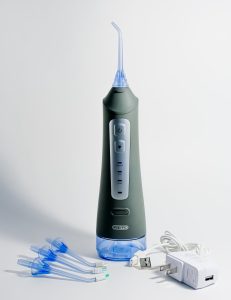

Another reason for gums bleeding when flossing or bleeding gums after flossing is improper technique. If you snap dental floss into your gum with too much force, it can damage the tissue and cause bleeding. Read more about how to floss your teeth properly and the best products for flossing for gum health.
Many people find that a water flosser is easier to use – and much more gentle on gums – than traditional dental floss. These devices, also known as oral irrigators, shoot a jet of water between each of your teeth. The cariPRO Cordless Water Flosser is a popular model with variable intensity settings, so you can start off slow while you get used to it. You can read about more of the best water flossers as well.
Bleeding gums without brushing
If you have particularly sensitive gums as a result of gum disease, simply eating food may be enough to cause them to bleed – especially hard or crunchy food.
Another possible reason for bleeding, inflamed or swollen gums between teeth is that some food has got stuck – often resulting in the gum bleeding around one tooth only. If you can’t dislodge any food by flossing (a water flosser is preferable to avoid pushing it down further) then ask your dentist to check it out.
If you mainly notice your gums bleeding at night, bruxism (teeth grinding) might be contributing to the problem. Our guide to bruxism explains more about the symptoms and treatments for this condition.
What if your gums are bleeding randomly, not just when you brush or eat? It’s alarming to see your gums bleeding for no reason, and certainly doesn’t point to healthy gums. This is probably a sign that your teeth need a proper cleaning at the dentist before you develop more serious gum disease.
Bleeding gums during pregnancy
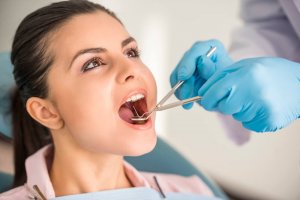

It’s quite common for women to experience swollen or bleeding gums while pregnant, especially during early pregnancy. This is because the hormonal changes that happen around this time encourage bacteria growth in the mouth, as well as making gum tissue more sensitive.
Even if you have impeccable oral hygiene and generally healthy gums, you may still develop what’s known as ‘pregnancy gingivitis’. And if you already have gum disease when you become pregnant, there is a greater risk of it developing into periodontitis.
Periodontal disease in pregnancy has been linked to low birth weight, preterm birth and pre-eclampsia. To reduce your chances of gum disease and bleeding gums during pregnancy, you can:
- Visit your dentist for regular tooth cleanings while you’re trying to get pregnant and throughout your pregnancy
- Tell your dentist that you’re trying or expecting so that he or she can give you the right care and advice
- Brush twice a day and floss daily
- Make sure you’re getting enough vitamin A, C & D, calcium, protein and phosphorus in your diet. If you want to take a pregnancy supplement, follow these guidelines from the Mayo Clinic and make sure you talk to your obstetrician before starting any supplements.
If you do get bleeding gums while pregnant despite all of this, don’t hesitate to see your dentist. Medicaid is free for pregnant women under a certain income level in most states and covers dental treatment. Ask about your options for keeping your child on Medicaid or CHIP after your pregnancy, and read our article on Medicare and Medicaid dental coverage.
For more information about overall oral health during pregnancy, including bleeding or sore gums, the American Dental Association has some useful resources here.
Child, toddler or baby bleeding gums
Noticing that your child or baby’s gums are bleeding is even more alarming than when it’s your own mouth.
Remember, first of all, that babies and toddlers love putting things in their mouths. It’s easy for them to pick up a small injury in this way which causes their gums to bleed.
But if you notice your child’s gums bleeding right along the gum line, or if their gums are just red and sore around the teeth, it’s probably one of three things:
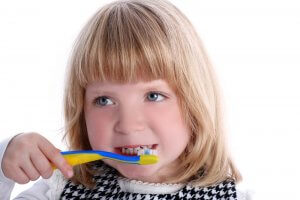

- Sore or bleeding gums in children can be caused by gum disease from poor oral hygiene, just as with adults. You may also notice receding gums and/or bad breath. (You can find out how to fix receding gums in our separate article.)
- Switching to a new toothbrush might give your child or toddler bleeding gums – always choose a toothbrush with soft bristles.
- Brushing too hard can damage your child’s tender gums – use gentle pressure and help or supervise until they are six or seven years old.
You should take your baby for regular dental checkups as soon as they have their first tooth. Not only does this let their dentist spot any problems early on; it also gets them used to the experience so visiting the dentist isn’t as scary when they get older.
Our guide to children’s oral health has lots more information on how to make sure your children have clean teeth and healthy gums, as well as how to prevent common problems like tooth decay.
Vitamin deficiency
Another thing that causes gums to bleed, or can worsen an existing problem, is deficiencies of certain vitamins.
Vitamin C, for example, helps with tissue growth and repair. It’s also important for strengthening teeth and bones, and protecting against early gum disease. If you’re not getting enough vitamin C, your gums may appear swollen and bleed more easily. Citrus fruits, strawberries, tomatoes, broccoli, potatoes and bell peppers are all good sources of vitamin C.
Vitamin K deficiency is also associated with excessive bleeding, since it helps with the blood clotting process. Leafy greens like kale, spinach and watercress contain vitamin K, as do soybeans and olive oil.
You can have a blood test to check whether you’re getting enough of these and other important vitamins.
How to stop bleeding gums
You’ve probably worked out by now that there is no instant way to heal gums, but you still may be wondering how to stop bleeding gums.
So how do you stop bleeding gums?
The best way to stop gums from bleeding is by improving your oral hygiene. You might also need to visit your dentist for a thorough dental cleaning, known as scaling, to properly remove all the plaque below the gum line.
If your gum disease is in the early stages, you may be able to reverse it and stop your gums from bleeding by adopting these habits for better oral hygiene and healthy gums:
- Brush your teeth at least twice a day; ideally once in the morning and again before bedtime
- Brush for two minutes, spending 30 seconds on each quadrant of your mouth
- Replace your toothbrush or toothbrush head every three months
- Floss daily, either with dental floss or a water flosser
- Use an antibacterial mouthwash to rinse (but not immediately after brushing)
- If you smoke, stop! Smoking increases the risk of gum disease
- Continue regular dental checkups – at least once a year and more often if advised
Brushing and flossing is the best bleeding gums treatment. If you’re unsure how to brush and floss your teeth properly, don’t feel shy about asking your dentist to show you the correct technique next time you visit. Doing it right can make all the difference to your oral health.
When to see your dentist about swollen and bleeding gums
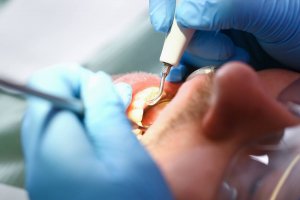

If your gums keep bleeding occasionally or remain sensitive, you should certainly mention it to your dentist at your next checkup. Simply improving your oral hygiene is not always enough to reverse the underlying cause and achieve a healthy gum; you might need a thorough dental cleaning. Your dentist will also check for other oral health problems that may be linked to the condition of your gums.
In some cases, though, you shouldn’t wait until your next routine checkup. Book a dental appointment straight away if you experience any of the following:
- You have constantly bleeding gums (they won’t stop bleeding)
- There are patches or irregular growths on your gums that stay for more than two weeks
- One or more teeth feel loose
- You’re in significant pain
If you don’t see a dentist about your gums bleeding and just ignore the problem, you well develop severe gum disease, which may eventually require the care of a periodontist—a gum specialist. This has been linked to diabetes and cardiovascular problems, and can cause tooth loss if it progresses far enough. It’s also possible you have another serious health condition which needs proper treatment.
If gum disease is advanced, you may require surgery to treat it. Periodontists will determine if traditional surgery or laser gum surgery is the better option for you.
Find a dentist near you who specializes in gum disease by calling 866-383-0748. A live operator will connect you to a periodontist in your area. Another option you may want to consider is making an online dentist appointment if you can’t get in to see one. You can read more about how teledentistry works in our separate article.
Best products for healthy gums
If you are wondering how to strengthen gums, there are various products which may help stop bleeding, redness or soreness and achieve a healthy gum by targeting the underlying causes like plaque buildup. Keep in mind that these should be used in conjunction with the good oral care habits mentioned above. You may be wondering how to stop gum bleeding immediately, but good gum health habits require daily and consistent effort; a new toothpaste won’t help much if you only brush every other day.
Best electric toothbrush for bleeding gums
People who struggle to clean their teeth properly often find that switching to an electric toothbrush makes a big difference. Find out all about the best electric toothbrushes.
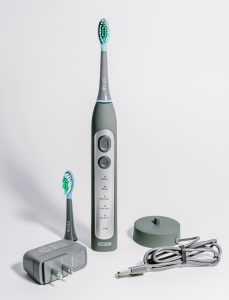

When it comes to keeping teeth clean while treating bleeding gums, we recommend the CariPRO Ultrasonic toothbrush. It has several features which make it a good toothbrush for treating bleeding gums:
- A timer to ensure you’re brushing each part of your mouth for long enough
- 40,000 vibrations per minute
- Angled DuPont bristles
- Proven to remove up to 7x more plaque than a manual toothbrush
In fact, CariPRO can improve your gum health in less than two weeks! If you’re ready to take better care of your gums, you can try the CariPRO by clicking on the link below.
Your gums may continue bleed when you first brush with an electric toothbrush – the bleeding may even get temporarily worse. That’s usually just a sign that your improved brushing is working, so keep it up for a few days and you should notice a difference.
Best toothpaste for bleeding gums
Lots of mainstream brands make ‘gum care’ toothpastes with ingredients to target gingivitis. Parodontax, for example, contains stannous fluoride which helps strengthen teeth and keep the seal between gums and teeth tight. Most reviewers agree that it has decreased instances of bleeding gums and results in long-lasting fresh breath.
For a natural bleeding gums treatment option, you could try Tom’s Propolis and Myrrh Toothpaste. Several reviewers say this has helped them achieve healthy gums.
Read more about the best toothpaste for gums.
Home remedies for bleeding gums
If you prefer to try a natural homemade remedy for bleeding gums, a simple saltwater rinse can help reduce bacteria and soothe irritated gums. Dissolve 1/2 teaspoon of salt in a glass of lukewarm water, swish it around in your mouth for 30 seconds, then spit it out. You can do this two or three times a day.
Coconut oil is another one of the popular bleeding gums home remedies. It has anti-inflammatory properties, and a study has shown that swishing it around your mouth and between your teeth (known as oil ‘pulling’) can significantly decrease plaque-induced gingivitis and lead to healthy gums.
Summary of bleeding gums causes and treatment
The table below summarizes the most common reasons why gums bleed that we’ve discussed in this article – and how to stop bleeding gums from becoming a problem for you.
Symptom | Possible Cause | Treatments |
Red/sore/swollen gums | Gingivitis (gum inflammation/early gum disease) | Improved oral health, dental cleaning, regular checkups |
Bleeding when brushing teeth or flossing (including children) | Gum disease | Improved oral health, dental cleaning, regular checkups |
New toothbrush or brushing routine | Keep going – you should adjust in a few days. Use a soft brush for children | New toothbrush or brushing routine |
Poor technique | Learn how to brush and floss properly (ask your dentist) | Poor technique |
Gums bleeding at night | Bruxism causing gum disease | Speak to your dentist |
Bleeding gums during pregnancy | Pregnancy gingivitis | Improved oral health and regular checkups |
Remember, even if you just have red gums or mild soreness and irritation right now, you may soon find your gums bleed when brushing your teeth if you don’t address the underlying cause.
Improving your oral hygiene may be enough to stop your gums from bleeding; otherwise, your dentist will need to perform a deep cleaning for truly healthy gums. Regular dental checkups are the best way to detect and treat the problems that cause bleeding gums, red gums and other oral health issues. Find a dentist near you now by calling 866-383-0748.
FAQs
Why do my gums bleed when I brush my teeth?
The short answer is, your gums bleed when brushing your teeth because of inflammation caused by plaque buildup, which can then lead to gingivitis or gum disease.
What is the best bleeding gums remedy?
The best remedy for bleeding gums is brushing and flossing at least twice a day. To help with irritation and soreness while you begin your road to better gum health, you can use special toothpastes.
Why are my gums bleeding at night?
The most common causes of night bleeding are bruxism — or teeth grinding, periodontitis and the presence of periodontal bacteria. Do you notice the presence of blood in your mouth when you wake up? If so, be sure to schedule a visit with your dentist.
CDC: Adult Oral Health Consulted 6 June 2024.
Mayo Clinic: Prenatal Vitamins Consulted 11 June 2024.
ADA: Pregnancy Consulted 11 June 2024.
NIH: Effect of coconut oil in plaque related gingivitis — A preliminary report Consulted 12 June 2024.




